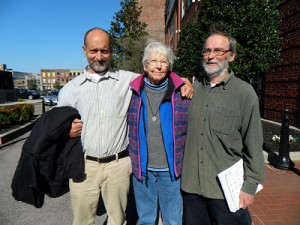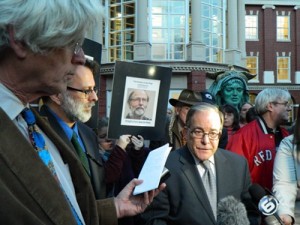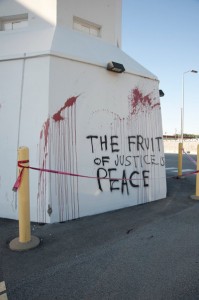KNOXVILLE—The three protesters who broke into the Y-12 National Security Complex in July 2012 and splashed human blood and spray-painted slogans on a uranium storage building were sentenced to three to five years in prison on Tuesday.
Megan Rice, an 84-year old Catholic nun who last lived in Washington, D.C., received the shortest sentence. She was sentenced to 35 months, or just under three years. Rice is the oldest of the three anti-nuclear weapons activists. She also has the least extensive criminal history, Judge Amul R. Thapar said during a 4.5-hour sentencing hearing in U.S. District Court in Knoxville on Tuesday afternoon.
The other two protesters, Greg Boertje-Obed and Michael Walli, both were sentenced to 62 months, or a little more than five years. They have more extensive prior records. Boertje-Obed is a 58-year-old house painter from Duluth, Minn., and Walli is a 64-year-old Catholic worker and Vietnam veteran from Washington, D.C. Thapar said Boertje-Obed has 40 arrests and more than 20 convictions, and he has previously served time in prison. So has Walli. He was released on Jan. 5, 2012—about six months before the break-in—after an eight-month federal sentence for an earlier trespassing incident at Y-12
.“What do I do when eight months didn’t deter him?” Thapar asked defense attorney Chris Irwin. “It’s getting worse, not better.”
Thapar struggled to answer the question of how long the defendants should be locked up in order to deter them from repeating their offenses and to discourage others who might engage in similar actions. He was unsatisfied with answers to that question from either the defense or the prosecution. Defense lawyers recommended time served, while the United States recommended longer sentences. But Thapar said the recommended sentences seemed extreme given the circumstances and did not distinguish between saboteurs and peace protesters.
Pictured above are the three anti-nuclear weapons protesters who broke into the Y-12 National Security Complex on July 28, 2012, and vandalized a uranium storage building. From left, they are Michael Walli, Megan Rice, and Greg Boertje-Obed.
“Here, it seems like overkill,” Thapar said of Rice’s recommended sentence. “Six-and-a-half years for Megan Rice? Isn’t it supposed to be sufficient but not greater than necessary?”
Announcing the shorter sentences, the judge cited Rice’s decades of service and Walli’s military history, among other things. And he said he gave similar sentences to Walli and Boertje-Obed to avoid sentencing disparities.
Even while emphasizing the importance of deterrence, though, Thapar acknowledged the good works of the defendants, which have ranged from volunteering in soup kitchens to teaching science in Africa.
“The court can say it is generally distressed to place good people behind bars,” Thapar said. “But, I continue to hold out hope that a significant sentence may deter…and lead (the defendants) back to the political process that they seem to have given up on. Without question, the law does not permit the breaking and entering into the secure facilities of the United States.”
Thapar urged the trio to use the political process and their community of supporters to go Washington, D.C., to try to abolish nuclear weapons.
“Breaking the law is not the answer,” Thapar said.
Irwin, second from left, is pictured with defense attorney Francis Lloyd at the Howard H. Baker Jr. U.S. Courthouse in Knoxville.
But it wasn’t clear that he had convinced the protesters. They and their supporters continued to insist that the nuclear weapons work being done at Y-12 violates international law.
“I make no apologies,” Walli told Thapar. “I am not remorseful. I would do it again.”
“We had to come to this facility, to call for its transformation,” Rice said.
All the sentences were less than the government had recommended, but federal prosecutors said they were satisfied.
“Judge Thapar had many complicating factors to consider, and we respect the sentences he pronounced today,” Assistant U.S. Attorney Jeffrey Theodore said Tuesday night.
Theodore said the defendants will receive credit for time served. They have been incarcerated since they were convicted in May 2013 on two felony counts of destroying U.S. property and attempting to injure national defense premises, a charge that falls under the sabotage section of the U.S. code.
Boertje-Obed, Rice, and Walli were each also sentenced to three years supervised release. And they have been ordered to pay roughly $53,000 in restitution for the damage caused when they cut through three fences in the high-security Protected Area at Y-12 on July 28, 2012, and splashed blood, spray-painted slogans, and hammered on the side of the $549 million Highly Enriched Uranium Materials Facility, which stores most of the nation’s bomb-grade uranium.
Defense attorney Chris Irwin had asked Thapar to release Walli on time served, which, so far, has been about nine months.
“My clients are going to prison for years,” Irwin said after the hearing when asked if he was pleased with the shorter-than-recommended sentences. “I’m never pleased to see people go to prison.”
Three anti-nuclear weapons activists cut through three fences in a high-security area at the Y-12 National Security Complex on July 28, 2012, splashed human blood and, quoting Proverbs, sprayed paint on the Highly Enriched Uranium Materials Facility. The protesters also hammered the building, causing it to chip, and strung up crime scene tape. (Submitted photo)
Walli had been facing the longest potential sentence, a range of about seven to nine years. Boertje-Obed’s recommended sentence had been about six to eight years, and Rice’s was roughly five to seven years.
Theodore called Boertje-Obed and Walli incorrigible habitual offenders whose criminal histories outweigh their good works.
“There has to be a heavy toll for people that are going to engage in this activity,” Theodore said. “They don’t have regrets about what they did. They are not going to be deterred.”
Rice asked Thapar for a life sentence, a request that was denied. She said her time in jail has been educational because she has learned about troubling prison conditions.
The three protesters, who called their Y-12 operation Transform Now Plowshares, have said they were nonviolent and religiously motivated when they broke into Y-12 in July 2012. They have said they were inspired by the nonviolent protests led by Martin Luther King Jr. and Mahatma Gandhi, among others.
But prosecutors argued during the May 2013 trial that the unprecedented security breach significantly disrupted Y-12 and interfered with the national defense. In addition to a two-week shutdown of nuclear operations and the damage to Y-12′s reputation, a secret shipment of materials that had been scheduled to arrive the day of the intrusion had to be delayed, prosecutors and government witnesses said during the May 2013 trial.
The 811-acre Y-12 plant was built during World War II to enrich uranium for the world’s first atomic bombs as part of the top-secret Manhattan Project. Today, it continues to play a key role in the nation’s nuclear weapons complex, storing most of the nation’s highly enriched uranium and supplying fuel for naval reactors, among other things.
Michele Naar-Obed, wife of Y-12 protester Greg Boertje-Obed, attended Tuesday’s hearing, and she said she has also participated in Plowshares protests. She said she thought a metaphorical window had been opened at the sentencing hearing.
“I am just feeling grateful that the judge was struggling with the letter of the law and the spirit of the law,” Naar-Obed said.
Boertje-Obed, Rice, and Walli are expected to serve at least 85 percent of their sentences. They could be let out early on supervised release if they receive maximum credit for good behavior.
In the meantime, the cases could be appealed, but that process could take 1.5 to two years, defense attorney Bill Quigley said.
“It’s going to be a long road,” Quigley said.
More information will be added as it becomes available.



